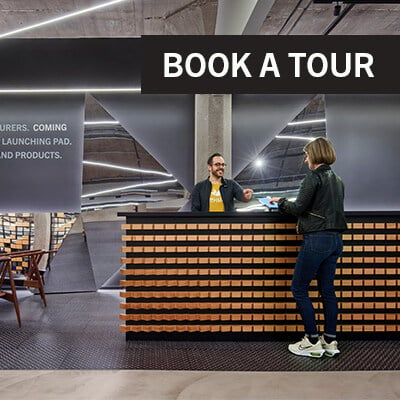
Melissa Cohen is a mentor of the mHUB MedTech Accelerator program and the Managing Director of NorthShore – Edward-Elmhurst Venture Capital, the strategic corporate venture fund for the recently merged Northshore University and Edward-Elmhurst Health System in Illinois and mHUB MedTech Accelerator Program Partner. Before her time as a venture capital investor, Cohen was Co-founder and CEO of a Chicago-based healthcare IT startup strategically acquired in 2019.
Types of Partnerships Between a MedTech Startup and a Health System
Early-stage startups often prioritize approaching health systems that have venture funds for access to capital. They should also consider the many partnership opportunities healthcare systems can provide beyond financial investment.
It’s clear that health systems can bring capital in multiple ways— via an investment or through pilot and customer relationship, but they also have an expertise, industry insight, and perspective that can be invaluable to a startup’s early journey. Yet, forming a relationship with a health system partner can be a daunting, complex process. If you’re a medtech startup founder, it’s important you know who to talk to, when to talk to them, and what to ask.
As a founder, getting caught in an echo chamber of your own ideas and opinions is inevitable. It’s important to combat this by consulting with experts to refine your startup thesis and strategy. Once you have the best first draft of your product's Minimum Viable Product (MVP) or company's thesis, start talking to health system leaders to receive feedback.
After a few hard conversations, you'll understand how your product fits into that specific system and can use that as a reference point for how it will fit into similarly sized, located, or structured systems. With enough reference points, you can gauge how your product fits into the larger healthcare ecosystem—including health systems, payers, industry, and, most importantly, patients.
During these conversations, ask questions about your product's clinical applications and understand how the payment model– which can be extremely complex in the healthcare sector– resonates. Asking questions about your planned go-to-market strategy and how you plan to acquire customers, especially if those customers are health systems, is also important. These conversations to validate your product market fit, revenue model, and customer acquisition strategy should happen as soon as possible, preferably during the product development stage, or you risk wasting your time, money, and energy.
If your product or company requires research to get to market, health systems are a likely partner, potentially in the form of clinical trials. Startups that don’t have to go through a regulatory pathway could look to a health system for a validation study, a proof of concept, or a pilot study. The hope would also be that the health system becomes a referenceable customer or pilot site for future sales conversations. Structuring a pilot or proof of concept study with quantifiable ROI for the health system customer can help you develop your value proposition. Regardless of stage, ROI calculations, time-to-value models, and customer references are very important.
If your startup already has a product in the market, you might look to a health system for a more traditional commercial relationship. Either way, startups should approach a health system as both a potential customer and a resource for today’s health system perspective.
 MedTech Accelerator Mentor Mel Cohen presenting at mHUB's 2022 Medtech Demo Day
MedTech Accelerator Mentor Mel Cohen presenting at mHUB's 2022 Medtech Demo Day
Getting Your Foot in The Door — And Keeping It There
Securing a meeting with someone at a health system can be challenging— clinicians are busy, administrators are under-resourced, and for the most part, hospital employees are not incentivized to talk to you, a novel startup founder. They are incentivized to do their jobs as best as possible, taking minimal risks at minimal cost and doing no harm.
The only hospital employees whose job descriptions not only incentivize but require them to talk to you are those with Innovation or Venture in their title. Even if your company is not actively fundraising, we have an incentive to take a meeting and hear your pitch.
If there isn’t an Innovation or Venture department to approach, ask yourself the following questions to help guide your outreach:
- What person/role will use my company's product?
- What person/role will pay for my company's product?
For example, suppose you are developing a device used in orthopedic surgery procedures. You would likely want to speak to orthopedic surgeons and those involved with purchasing supplies for the health system. Before that, you must understand who is paying for the device. Is it a tool that the hospital buys outright? Or is it something that the hospital will bill patients' insurance companies for?
Suppose you're developing a digital product that you hope to sell within one or two departments (like the ED, for example). You may have a different sales process than a hospital-wide, enterprise-level, product that requires buy-in to the C-Suite. Who you connect with will vary depending on your product and the health system.
A mistake I see many medtech startups make is only understanding one perspective or the other. If you only get the perspective from the end user of your product, often a clinician who isn’t considering how your product will fit into the P&L of their service line, there may be no business case for the product to be purchased by the health system.
Suppose you only look at the financial perspective. You could walk away understanding the health system's budgeting process and your ROI proposition but without understanding the system's clinical applications.
Navigating a health system can be tricky, especially if you're an underrepresented founder in healthcare and medtech innovation. As a formerly underrepresented female founder and now underrepresented investor, I speak from experience when I say it's okay to target health systems with DEI (diversity, equity, and inclusion) initiatives that will factor in those metrics when sourcing potential investments and vendors. If the health system isn't public about their DEI or ESG efforts, assume they're still aware of the asymmetries.
If you're a minority-founded, woman-owned business, put that front and center in your initial pitch email. As a woman in a male-dominated industry, I have used that tactic when fundraising and interviewing— but understand that only gets you as far as the first meeting.
Ultimately, the integrity and value of your product and business will determine how far in the process you go. Investors and buyers will not make the final decision based on your profile alone, so don't worry about their assumptions, use them as leverage to get your foot in the door.
Who is Incentivized to Leverage Innovation?
When a founder has a product they've created or brought to market and is hoping to sell it, they're excited by its potential. There’s so much thought put into the go-to-market strategy, how their product adds value to the system, and their overall pitch.
One thing founders, especially in healthcare, need to spend more time thinking about is whether or not their product and go-to-market strategy are aligned with the incentives of who they are selling to. Health systems are generally conservative in their initiatives. If your prospective buyer benefits most by keeping their head down, doing their job, and not causing too much of an uproar in their department — they're probably not the right customer for an early-stage, high-risk startup product.
Utility players in a health system, such as the supply chain employee at the hospital whose job is to make sure the hospital is buying, managing, and distributing supplies at the best price possible, will not be the easiest to convince to try a new, innovative product and disrupt the status quo. They're managing costs, not generating revenue. When they're doing everything right, no one pays attention to them.
That doesn't mean they won't, it depends on their level of risk tolerance and the story you're able to tell in your first meeting, but I often see founders neglecting to think through the risk profile and incentive structure behind their product. Medtech founders should think about innovating for the groups that are most primed to leverage innovation.
Advice From an Entrepreneur
There are two things I think about every day as a former founder.
The first, which will contradict what I am about to say, is that everyone will have advice for you. The radio playing in your head will be constant—you will see blog posts, books, podcasts, and everyone and their mom will be chiming in to tell you how to run your business, warranted or not. Your job as a founder is to determine when to lower the volume on that radio.
The second thing is something I wish I had learned sooner as a founder, and it applies to all roles that manage or interface with a team. You will have a million jobs as a founder, and most of them will be unseen. What will be consistently seen, often under a magnifying glass, is your behavior and demeanor towards others. You should always be conscious of that when making decisions.
In a huge company where the salesperson might be a little erratic, you don't worry as much because there is a whole system built around this business and product to fall back on. In a startup with a few employees, the deal is not going through if someone gives you trust issues as an investor or customer, especially if this person is the founder or CEO
For that reason, you must be a stable, calming force to your investors, employees, and customers. That's your number one job. The reason that's so important is because all the unseen stuff you do to get ready for those board meetings, pitch meetings, team meetings—it doesn't matter if when you're there, you seem frantic and stressed. You need to be unbothered, even if you are very much bothered.
You'll get great and terrible news— often on the same day and hours apart— but you must work at how you take and deliver them. That will make or break how your team, board, investors, and customers trust and connect with you.
As a former founder, I'm acutely aware of the mental and emotional toll that founding and running a company can take on you. I am in no way implying that you shouldn't show stress, reach out for help, vent, or share your concerns, fears, worries, etc. There is a myriad of resources out there to support founders, and investors like myself will always take a call for offline advice if you need it. My comment is on moderating the mercurial temperament that can come from the ebbs and flows of startup cycles and empowering your stakeholders to trust you.
Summary
- Consider the many different partnership opportunities a health system can provide and understand what makes a system tick before you approach them. What initiatives are they promoting, and what departments or teams are connected to those initiatives and willing to approach innovative solutions to execute them?
- Consider the perspective of your product's end user and end payer. You're wasting a lot of time if you don't have both perspectives.
- As a founder, you will experience extraordinary highs and devastating lows while managing your many jobs. All the unseen work you do could be wasted if you appear frantic and unreliable to the stakeholders (investors, customers, and employees) that need to trust you. Take care of your mental health, recognize the transience of each success and failure, and rely on your trusted confidantes to guide you through tough times.
To learn more about the mHUB MedTech Accelerator program and hear from mentors like Melissa, click here.






